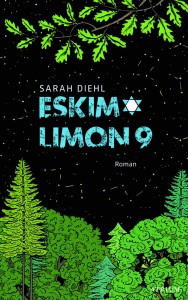When German friends of mine choose to move from Darmstadt, in Hesse, into the surrounding countryside, I shake my head in disbelief. That an Israeli family would leave Tel Aviv not, as many Israelis do, to move to Berlin (see the German-language blog post offering ten tips for Israelis in Berlin), but rather to the tiny Hessian town of Niederbrechen, seems audacious, if not outright absurd. This scenario, however, is the starting point of Sarah Diehl’s debut novel Eskimo Limon 9. The novel depicts a “very particular kind of culture clash,” as the book’s flap announces.

Book cover
© Atrium publishers
Some of the characters are Israelis, and they have little interest in discussing Germany’s past or the history of European Jews.
“The only thing in the Jewish Museum that will remind me of home will probably be the metal detector you have to go through at the entrance.”
The novel’s Israeli father Chen wishes Germans “would associate us with Eskimo Limon instead of six million dead.” The title of the book refers to a film series of the same name, which aired in Germany in the 1980s as Eis am Stil (Popsicle), “one of the few Israeli pop culture phenomena […] familiar to German audiences.” Many assume that the series is Italian, which—as the author of the novel argues—shows how selective Germans’ perception of Israel can be, and how limited their idea of Jewishness often is.
Other characters are natives of Niederbrechen. → continue reading
Or: Are You up for this Plan?
During the week of 21 to 27 October 2013, the Academy of the Jewish Museum Berlin, in cooperation with Kulturkind e.V., will host readings, workshops, and an open day for the public with the theme “Multifaceted: a book week on diversity in children’s and young adult literature.” Employees of various departments have been vigorously reading, discussing, and preparing a selection of books for the occasion. Some of these books have already been introduced here over the course of the last weeks.

“Meshugge” is one of the words Ace uses to comment on stuff in the children’s novel When Life Gives You O.J. Ace is the extraordinary grandpa of Zelda Fried aka Zelly, Zellybelly, Zeldale, or Zelly-bean. Grandpa has a plan that Zelly finds completely meschugge, as well as downright dumb. But what on earth is a girl to do? She has told her grandpa she is up for the scheme, and Ace would never understand if she were to back out now, or if she failed to muster the chutzpah* to see the thing through. And in any case, there’s still a chance grandpa’s plan may succeed. In which case Zelly’s dearest dream would finally come true—perhaps even before her eleventh birthday! → continue reading
On Behind-the-scenes Labor in the Cultural Economy

“Translators create universal literature.” José Saramago, Nobel Prize Winner for Literature 1998
© VdÜ (Germany’s Union of Literary Translators), design: Christian Hoffmann
Today is Giornata mondiale della traduzione, Międzynarodowy Dzień Tłumacza, Journée mondiale de la traduction, Uluslararası Çeviri Günü or Día Internacional de la Traducción—which is to say, International Translation Day, an occasion established in 1991 by the Fédération Internationale des Traducteurs (FIT: International Federation of Translators) in order to raise public awareness of the cultural impact of the wordsmith’s trade. 30 September is the anniversary of the death in 420 CE of Hieronymus, who translated the Hebrew Bible into Latin. Since ancient times translation has influenced the target language in question, and in the globally networked world of today it is our constant companion. Germany’s Union of Literary Translators (VdÜ) puts it in a nutshell: “Wherever words have been spoken, written, read, or even sung, translators have had a finger in the pie, and indeed they still do; and it is thanks to them that the whole world is at home in its own language.” → continue reading


